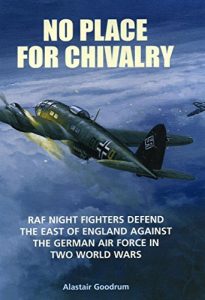Night fighting in the air is a devious and clandestine form of mortal combat. In the blackness of night, success goes to the resolute hunter who stalks his prey unseen, and strikes from behind, swiftly and mercilessly. A sudden burst of machine-gun or cannon fire into an opponent’s belly often caught the enemy unprepared, obliterating men and machines in a hail of explosions. Chivalry had no place in the combats of the night sky. A corridor from The Wash to Birmingham was turned into a fierce battleground in two world wars. The air route from Germany and the occupied countries through this corridor, to targets right across the industrial heartland of England, became a three-dimensional combat zone that proved to be as grim a killing ground by night as anywhere else in the land. No Place for Chivalry encapsulates the story of the air defense of England against attack by night. By taking the area covered by RAF Wittering and Digby sectors, looking at the action of night fighter squadrons operating from those stations and their satellite airfields, the way the battle developed, its timeline of events, the events themselves and the organization of those involved, a coherent picture of how the night air defense of Britain evolved is formed.
The narrative is pitched at a level of detail and with such human interest content that it enables readers not only to grasp what is happening and why but also to feel the tensions, frustrations and euphoria of success that the aircrews felt at the time. The reader gets a view from the cockpit or gun turret, to ‘meet’ and ‘fly’ with the men of both sides who fought in the air at night - men whose moral standards on the ground were above reproach but, when fighting in the night sky, gave no quarter.
The narrative is pitched at a level of detail and with such human interest content that it enables readers not only to grasp what is happening and why but also to feel the tensions, frustrations and euphoria of success that the aircrews felt at the time. The reader gets a view from the cockpit or gun turret, to ‘meet’ and ‘fly’ with the men of both sides who fought in the air at night - men whose moral standards on the ground were above reproach but, when fighting in the night sky, gave no quarter.






